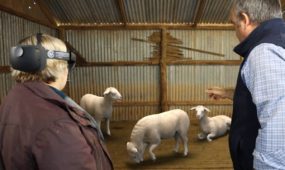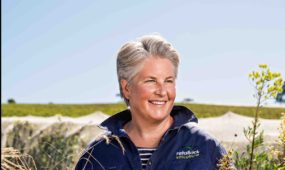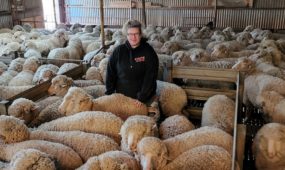Street Wise: George Street Wines
Primary Industries
IT’S no secret that the wine distribution world is in turmoil. So when Peter McAtamney of Wine Business Solutions released an on-premise wine sales report showing George Street Wines had raced to second spot in the Top 10 South Australian/Northern Territory Distributors in the on-premise with seven percent of the market compared to just 2.7 percent last year, eyebrows were raised. Especially when that growth appears to have been at the expense of some big, long-established names.

Sign up to receive notifications about new stories in this category.
Thank you for subscribing to story notifications.
So who is George Street Wines? Well, they’re a dynamic fly-under-the-radar business located in a nondescript building in the backstreets of Thebarton, in Adelaide’s inner west. In George Street, of course, a quirky mix of old pubs, character houses, secondhand outlets and light industrial. They’ve been in business since January 2000. Darren Erbsland is managing director, assisted by sales manager of SA and NT, Aree Mitchell. The portfolio is impressive: The Lane Vineyard, Bannockburn and Bremerton to name a few. And in the biggest clue to its success, George Street Wines has focused on the on-premise from day one – it’s 60 percent of its turnover. When export markets collapsed and panic set in, distributors scrambled for a piece of the domestic action amidst pressure from wineries needing markets. George Street Wines was sitting pretty, having embraced on-premise long ago and spending 14 years building relationships and refining its business and sales approach.
Darren launched the business around the same time that Coles’ big-box store Quaffers (now First Choice) opened on Unley Road. He knew then that the game was about to change – dramatically. “When I saw that big-box format appear I knew the industry was starting to divide into those two channels – Coles and Woolies,” Darren says. “But as we all know, the discounted format doesn’t give a brand longevity, it makes for a very finite brand life. Brands are built in the on-premise and that is what we focused on from the start. It was also about self-preservation; if all of our sales were through the chains, well, the wineries wouldn’t need us. The on-trade is where the brands need to be to build for the long term. We can achieve volume growth and objectives without the discount path, so brand equity is retained. Consumers drink wine from a retailer because they tried it last night at a restaurant, not because it’s on special.”
George Street Wines has a team of five reps on the road in South Australia and a sub-agency in Darwin. Darren and Aree also still wear out shoe leather doing the rounds and reinforcing the emphasis on communication, flexibility and relationship building. Aree, who is charged with keeping the sales team motivated and has a cut in the business, says a big part of their success is the sales team, some of whom have worked ‘on the other side’ in restaurants.
What’s the one thing she looks for in staff? “Personality,” she says. “You can teach someone wine knowledge to a certain extent and you can teach them selling, but you’re either a personality or you’re not, and personality opens doors. Our people are also very enthusiastic and have an attitude that ‘I’m not going to be beaten.’ Tenacity is a big part of what we do. I mean, it’s tough out there. It’s exhausting work. Getting into a restaurant can sometimes take a year; just getting an appointment can take up to three months. A lot of tenacity is required, and we have it.”
Darren adds, “In the past we have made the mistake of employing wine experts, for want of a better word, and they have failed miserably because all they want to do is impart what they know on the customer. The communication has to come the other way. We need to know what the customer needs. It often has nothing to do with what side of the hill the grapes were picked. Having said that, the market needs more product knowledge than ever before, but the customer will let you know what they need to know. A rep who only wants to impart everything they know doesn’t get anywhere.”
George Street Wines has a policy of no more than two brands per region, and they can’t be in conflict – for instance in McLaren Vale it has the boutique brand Willunga 100 as well as the bigger, stronger brand Woodstock. The business has also been known to knock back some potentially lucrative deals from some very big high-profile wine brands. “If it doesn’t fit the culture of our business and is at odds with our long-term goals, then we won’t touch it, however tempting it would be to do so,” Darren says. “Whereas if you look at a brand like Bremerton, which we’ve recently taken on, it fits our culture perfectly… brilliant wines, good people, a no-discount philosophy and a great story.”
In terms of on-premise trends, Aree says the worldwide phenomenon that has seen fine dining disappearing, has led to a dynamic wine scene at the better gastro pubs in Australia. She says Sauvignon Blanc has “come back a bit” but is still dominating, along with Pinot Grigio. “A lot of gastro pubs are supporting alternative varieties,” she says. “And from what we hear, most wineries are continuing to experiment with things like Tempranillo, Fiano, Gruner Veltliner and Sangiovese and it’s exciting because the support is there at these restaurants, and the consumer is in the mood to experiment as well.”
You’ll be hearing a lot more about George Street Cellars: the business is expanding nationally. “We’re excited about the opportunity we now have to bring our unique distribution model Australia wide,” Darren says.
“We have continued to grow through some of the most challenging times in the wine industry with all of our key brands increasing in volume year after year. It’s time to take that to a bigger stage.”
This article originally appeared in WBM – Australia’s Wine Business Magazine.
You can download the WBM app for iOS devices from the iTunes Apple Store – free of charge.
Jump to next article



